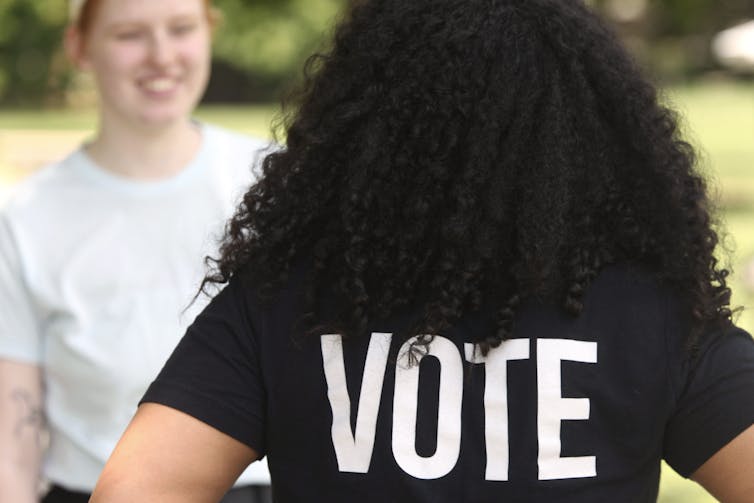Election anxiety doesn’t need to win − here are 3 science-backed strategies from a clinical psycholo
Given the polarized political climate in the US, it’s hard not to be affected by the election. But there are ways to make sure stress and uncertainty don’t send you on a downward spiral.

Uncertainty about the election getting to you? Is anxiety the dominant feature of your emotional landscape, maybe with a small sprinkling of impending doom?
You are not alone. A recent survey found 69% of American adults are seriously stressed about the 2024 presidential election.
It’s difficult not to be worked up about politics in today’s polarized climate. Regardless of which side of the political aisle you sit on, you may find yourself glued to your browser or TV, gobbling up every tiny tidbit of news and feeling your stress levels skyrocket.
I’m a psychologist who develops and tests strategies for combating anxiety. As I constantly tell my stressed-out clients, when it comes to election news, there’s a fine line between being well informed and being oversaturated with information.
If you’re ready to short-circuit your stress spiral, here are three science-backed strategies for coping with anxiety in times of uncertainty.
Approach your emotions with mindfulness
Being mindful refers to the quality of awareness you bring to your experiences – specifically, nonjudgmental attention focused on what’s happening right now.
Mindfulness practices originated in Eastern spiritual traditions, including Buddhism. Over the past several decades, mindfulness has gained popularity as a powerful tool for managing anxiety. For instance, meditation apps such as Headspace and Calm incorporate it. Even if meditation isn’t your thing, though, you can still apply nonjudgmental awareness, focused on the present, to election-related anxiety.
Be present. Anxiety can draw you into an uncomfortable spiral of “what-ifs” about the future. When you make a point to be present, you remind yourself what is actually happening right now, rather than letting hypothetical fears take over.
Although you may have serious concerns about the fate of the nation, those outcomes have not yet come to bear. As I tell my patients, “We’ll cross that bridge if we come to it. For now, focus on the step right in front of you.”
If you notice yourself getting carried away by thoughts of the future, you can pull yourself back to the present by bringing awareness to simple sensations – the feel of your feet on the floor, the rhythm of your breath, or the sounds around you – and remind yourself that you are safe in the current moment.
Pay nonjudgmental attention. Many people are hard on themselves for feeling strong emotions. This critical mindset might look like telling yourself that you’re overreacting, or that it’s weak to let others see that you’re upset. You might even view that uncomfortable feeling in the pit of your stomach as evidence that negative outcomes are right around the corner.
Making judgments about your emotions only serves to make you feel worse. In fact, researchers find that pushing away emotions or beating yourself up for having them leads to more frequent and stronger anxiety.
Instead, try giving yourself a break. Tell yourself, “This election is high stakes, so it makes sense I’m anxious.” Then, notice if your anxiety is driven by a fear about the future, and bring yourself back to the present.

Get flexible with your thinking
Cognitive flexibility is the ability to shift away from rigid, all-or-nothing thinking about the future.
When people are anxious, they tend to focus on the worst-case scenario. For example, you might be telling yourself, “With this candidate in office, things will be terrible and I won’t be able to cope.”
In this scenario, I encourage my patients to move past that initial thought of how awful it will be and instead consider exactly how they will respond to the inauguration, the next day, week, month and so on.
Cognitive flexibility allows you to explore how you will cope, even in the face of a negative outcome, helping you feel a bit less out of control. If you’re experiencing a lot of anxiety about the election, try thinking through what you’d do if the undesirable candidate takes office – thoughts like “I’ll donate to causes that are important to me” and “I’ll attend protests.”
Choose your actions with intention
Another tool for managing your anxiety is to consider whether your behaviors are affecting how you feel.
Remember, for instance, the goal of 24-hour news networks is to increase ratings. It’s in their interest to keep you riveted to your screens by making it seem like important announcements are imminent. As a result, it may feel difficult to disconnect and take part in your usual self-care behavior.
Try telling yourself, “If something happens, someone will text me,” and go for a walk or, better yet, to bed. Keeping up with healthy habits can help reduce your vulnerability to uncontrolled anxiety.

Post-Election Day, you may continue to feel drawn to the news and motivated to show up – whether that means donating, volunteering or protesting – for a variety of causes you think will be affected by the election results. Many people describe feeling guilty if they say no or disengage, leading them to overcommit and wind up overwhelmed.
If this sounds like you, try reminding yourself that taking a break from politics to cook, engage with your family or friends, get some work done or go to the gym does not mean you don’t care. In fact, keeping up with the activities that fuel you will give you the energy to contribute to important causes more meaningfully.
Shannon Sauer-Zavala receives funding from the National Institute of Mental Health.
Read These Next
AI’s growing appetite for power is putting Pennsylvania’s aging electricity grid to the test
As AI data centers are added to Pennsylvania’s existing infrastructure, they bring the promise of…
Why US third parties perform best in the Northeast
Many Americans are unhappy with the two major parties but seldom support alternatives. New England is…
Abortion laws show that public policy doesn’t always line up with public opinion
Polls indicate majority support for abortion rights in most states, but laws differ greatly between…





